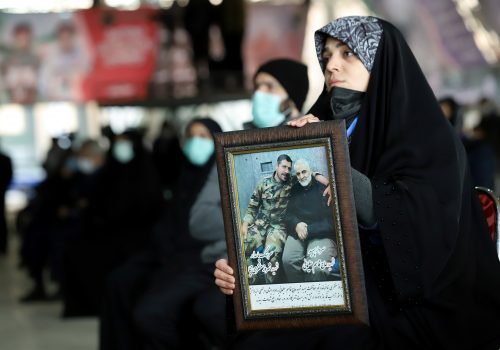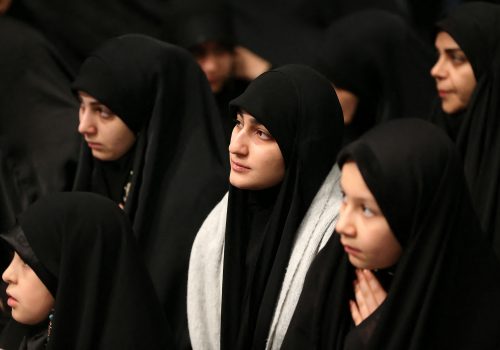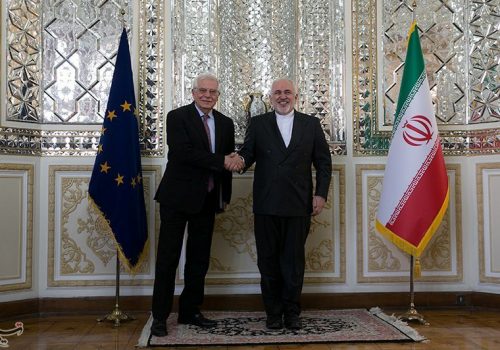Soleimani assassination failed to re-establish ‘deterrence’ against Iran
A year after the Trump administration assassinated Iran’s most respected—and by some reviled—military and intelligence commander, many of the dire prognostications at the time by analysts—including this one—have not come true.
Iran has not, so far, retaliated in kind for the killing by drone of longtime Quds Force leader Qasem Soleimani and nine others, including the deputy head of the Iran-backed Iraqi militia movement, at Baghdad’s international airport on January 3, 2020. Iran did launch rockets at an Iraqi base where Americans were located, causing concussions and other brain injuries to 100 servicemen and women but no fatalities. The biggest death toll came on January 8, 2020 when a panicked member of the Islamic Revolutionary Guards Corps (IRGC) mistook a Ukrainian civilian airliner for a hostile American jet, shooting down the plane and killing all 176 on board. Many were Iranian students returning to Canada after a holiday break.
Significantly, Iran has not withdrawn from the 2015 nuclear deal or quit the 1970 nuclear Non-Proliferation Treaty. It has, though, moved outside restrictions on its stockpiles of low-enriched uranium and now possesses enough material for several bombs—if enriched to weapons grade. Legislation passed by the Iranian parliament after the Israeli-orchestrated assassination on November 27, 2020 of another prominent Iranian—nuclear scientist Mohsen Fakhrizadeh—required an increase in the level of enrichment to 20 percent, closer to the weapons threshold, and reduced scrutiny from the International Atomic Energy Agency. However, the law has not yet been implemented and appears to have been shelved while Iran waits to see if incoming US President Joe Biden fulfills his promise to return to compliance with the Joint Comprehensive Plan of Action (JCPOA) if Iran does so as well.
In other ways, however, Iran has already exacted revenge for the killings. The death of Soleimani did not, as asserted by Secretary of State Mike Pompeo, re-establish deterrence against more Iranian-backed attacks. Two Americans and a British national died in rocket attacks on an Iraqi base in March 2020 and attacks by Iran-backed militias have continued. The US military presence in Iraq has been reduced under pressure from Iraqi politicians who no longer want to see their country used as a battleground between their influential neighbor and the world’s remaining superpower. Pompeo has repeatedly threatened to close the US Embassy in Baghdad if any more Americans are hurt in rocket attacks on the Green Zone by Iran-backed militias. That would be another gift to Tehran.
The threat of a wider war between the US and Iran remains as both the Trump administration and Israel have recently deployed more assets to the region including submarines, aircraft carriers and B-52 bombers. President Trump ominously tweeted on December 23 that if “if one American is killed [in Iraq], I will hold Iran responsible.”
Such a conflict would be a horrible climax to the failed US policy of “maximum pressure” that saw the US withdraw unilaterally from the JCPOA in 2018 while Iran was in full compliance. The assassination of Soleimani effectively ended any chance that Iran would negotiate with the man who ordered his killing. While Soleimani was reviled for his role in attacks on US troops in Iraq after the US invasion and in propping up the murderous dictatorship of Syrian President Bashar al-Assad, many Iranians saw him as an apolitical patriot who kept the Sunni fundamentalist killers of the Islamic State of Iraq and al-Sham (ISIS) far from Iran’s borders. It should also be remembered that after the September 11, 2001 terrorist attacks, Soleimani’s Quds Force provided intelligence indirectly to US troops via the Afghan Northern Alliance that facilitated the quick overthrow of the Taliban regime. Only after the George W. Bush administration put Iran on an “axis of evil” and made plain that it would welcome the demise of the Islamic Republic along with Saddam Hussein’s regime did Soleimani become such a dedicated and deadly American foe.Following the rise of the ISIS in 2014, however, the Quds Force and Iraqi militias again worked indirectly with the US to push ISIS out of Mosul and northern Iraq, providing the ground forces while the Americans used air power.
Like so many of Trump’s decisions, the drone assassination seemed less motivated by strategic vision than by the US president’s never-ending desire to grab attention and by an effort to look “strong” after failing to respond to a series of Iranian provocations in the preceding months. Not married to any realistic negotiating strategy, this act of violence merely confirmed to the Iranian government that Trump either sought regime change or simply had no clue what to do after Iran refused to accept new talks on a never clearly defined “better deal.”
So the Iranian government did what it so often has done over the past forty-one years: it hunkered down and pursued a strategy of economic “resistance,” smuggling oil to China, Venezuela and other customers at a discount and beefing up domestic industries. It persisted despite the ravages of COVID-19, which hit Iran harder than its neighbors. Iran also continued to repress domestic dissent, going so far as to execute an Iranian journalist who had been lured from exile in France to Iraq and kidnapped there.
If Iran’s image suffered, that of the United States sank as well as the world watched the Trump administration’s botched response to the pandemic. Trump’s refusal to accept the results of the 2020 presidential elections further tarnished the model of American democracy even if his frenzied machinations ultimately fail to prolong his stay in office.
After a terrible year, the need for economic recovery is acute in Iran, its neighbors and around the globe. There is a window for a return to diplomacy with Iran before its own presidential elections in June. The United States—and Israel—can’t kill their way to Iranian non-proliferation or accomplish that goal through cyber attacks. Only diplomacy has proven effective in constraining Iran’s nuclear activities. It is the only sensible way forward.
Barbara Slavin is director of the Future of Iran Initiative at the Atlantic Council. Follow her on Twitter: @BarbaraSlavin1.
Image: Iraqi women gather at the scene where Iran's Quds Force top commander Qassem Soleimani and Iraqi militia commander Abu Mahdi al-Muhandis were killed in a U.S. airstrike at Baghdad airport, Iraq February 13, 2020. REUTERS/Wissam al-Okaili/File Photo


